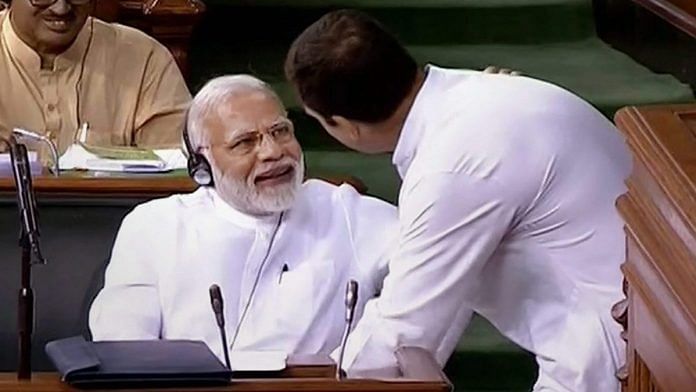New Delhi: The 16th Lok Sabha had opened in dramatic fashion with Prime Minister Narendra Modi touching his head to the steps leading up to Parliament when he entered it for the first time on 20 May 2014. He also choked up twice while making an address in the Central Hall after being elected BJP parliamentary party leader, calling Parliament a “temple of democracy”.
Nearly five years later, the final session of the 16th Lok Sabha drew to a close with opposition leaders giving Modi flak for not being a regular attendee in the “temple of democracy”.
Unlike other MPs, the prime minister does not need to sign the attendance register, and so no official record is available of the number of days he has been absent from the House when Parliament has been in session.
On a plethora of issues — from surgical strikes to demonetisation or the recent controversy over the purchase of the Rafale fighter jets — the opposition demanded statements from the PM on the floor of the House, but Modi has obliged only on a handful of occasions.
Rahul Gandhi’s hug and wink
It was not only Modi who resorted to histrionics during the course of the 16th Lok Sabha. His principal political opponent, Congress president Rahul Gandhi, also occupied much of the space in social media and TV channels when, on 20 July 2018, while participating in a debate on a no-confidence motion against the NDA, he first walked across to the treasury benches to hug Prime Minister Modi, and then returned to his seat and winked at his colleagues.
The PM might have initially been taken aback, but recovered soon enough and re-enacted Gandhi’s wink while responding to his speech. Modi said the entire nation saw what Gandhi had done.
Also read: We must question our MPs when Lok Sabha session works for less than 50% of total time
Changing age-old traditions
Besides histrionics, drama and many disruptions, the 16th Lok Sabha also witnessed changes to age-old traditions. In 2017, the date of the union budget was brought forward to 1 February from last working day of the month.
The previous NDA government, headed by Atal Bihari Vajpayee, had also changed a budget-related tradition — it had brought forward the time of the budget speech from 5pm to 11am.
But the date of the budget was not the only change. The year 2017 also saw the railway budget, which was earlier presented separately, being subsumed into the union budget.
No-confidence & disruptions
As mentioned earlier, 20 July 2018 saw the opposition moving a no-confidence motion against the government. The motion was defeated by a huge margin.
In the history of India’s Parliament, 27 no-confidence motions have been taken up till date. All have been defeated except for one in 1979, when PM Morarji Desai resigned before the motion could be put to a vote.
The 16th Lok Sabha also one of the most disrupted in recent times, marked by frequent adjournments.
Also read: Lok Sabha passes 10% quota for upper castes, opposition supports it despite reservations



